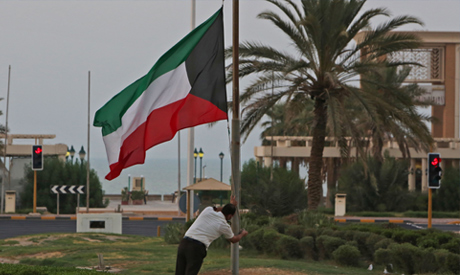
The Kuwaiti flag is lowered to half-mast outside the Dasman Diabetes Institute in Kuwait City on September 29, 2020, as the country mourns the death of emir Sheikh Sabah al-Ahmad Al-Sabah. AFP
A recap of the key events in the Gulf emirate Kuwait since its independence nearly six decades ago:
- Independence -
A British protectorate since 1899, Kuwait obtains independence on June 19, 1961.
With a hereditary monarchy, the emirate had been led since 1756 by the Al-Sabah family.
- Parliamentary system -
On November 11, 1962, a constitution provides for the election of a national assembly by direct suffrage, comprising 50 parliamentarians with four-year mandates.
Kuwait is the first Arab Gulf monarchy to introduce a parliamentary system, and its first legislative elections are held in 1963.
- Iraq invasion -
In 1963 Iraq recognises Kuwait after having attempted to annex it after its independence.
However, a decade later Iraqi troops occupy the Samitah border post. Under international pressure, Iraq withdraws in 1974.
Iraq's Saddam Hussein invades Kuwait on August 2, 1990, sparking international condemnation, and occupies it for seven months.
- Operation Desert Storm -
In February 1991 a US-led coalition known as Operation Desert Storm liberates Kuwait.
In July the emirate resumes its exports of crude oil after bringing under control fires started by the Iraqis in around 700 oil wells.
A few years later, Iraq recognises Kuwait's UN-defined maritime and land borders.
- On/off elections -
The emir suspended parliamentary life in Kuwait several times -- from 1976 until 1981, and then again from 1986 to 1992.
In October 1992 an opposition alliance grouping Islamists, liberals and nationalists wins legislative elections, gaining 32 seats out of 50.
- Iraq again -
In 2003 Kuwait serves as a bridgehead for the launch of the invasion of Iraq by the US-British coalition which will lead to the overthrow of Saddam and his regime.
The following year Kuwait re-establishes diplomatic relations with Iraq.
- Women enter politics -
On May 16, 2005, women are granted the right to vote and to stand in elections.
The emirate's first woman minister is named the following month.
- Changing emirs -
Emir Sheikh Jaber al-Ahmad al-Sabah dies on January 24, 2006, sparking a political crisis.
Parliament removes his replacement after just over a week in power on health grounds.
Prime Minister Sheikh Sabah al-Ahmad al-Sabah takes the throne.
The new emir dissolves parliament in May that year and a prolonged period of instability ensues.
From 2006 to 2013, almost a dozen governments are formed in Kuwait and parliament is dissolved six times.
- Deadliest attack -
In March 2015, Kuwait joins a Saudi-led coalition that is formed to fight Shiite Huthi rebels in Yemen.
A suicide attack three months later against a Shiite mosque in Kuwait City kills 26 people.
It is the deadliest attack in the country's history and is claimed by the Islamic State group.
- Emir's health concerns -
In 2019, Sheikh Sabah undergoes medical tests shortly after arriving in the United States, leading to the cancellation of a planned meeting with President Donald Trump.
On July 18, 2020, the 91-year-old emir is hospitalised.
The crown prince, Sheikh Nawaf al-Ahmad Al-Sabah, 83, steps in as partial ruler.
On September 29, the palace announces that Sheikh Sabah has died aged 91.
Short link: